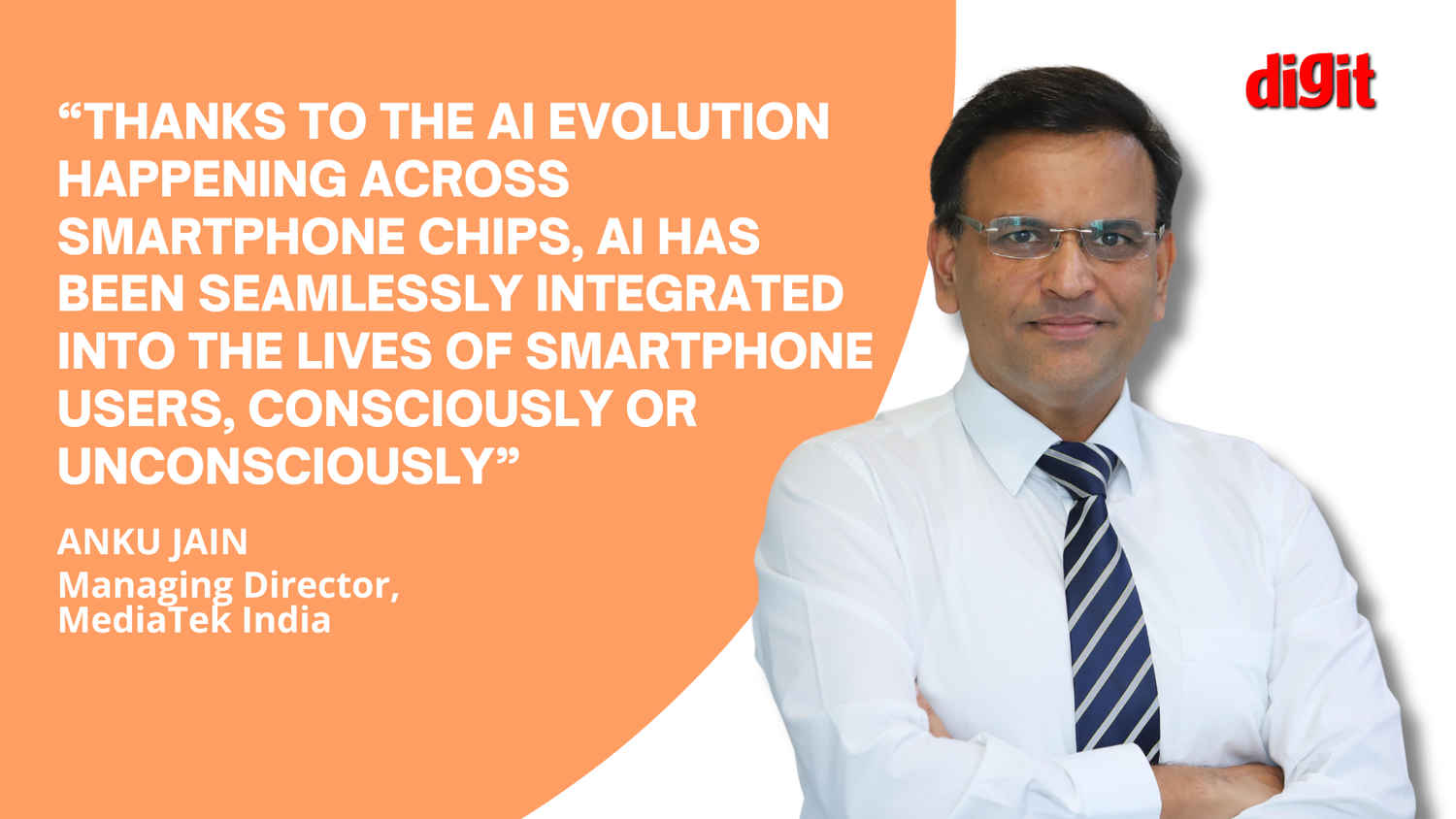MediaTek India’s Anku Jain explains the impact of AI across different sectors in India

On the 23rd Anniversary of Digit Magazine, we invited stalwarts and leaders from the tech industry to give their perspectives on the role of AI (Artificial Intelligence) in India. Mr Anku Jain, Managing Director, MediaTek India, shares his insights on the impact of AI across different sectors in India.
According to Mr Jain, “AI has started impacting almost all sectors in India, with a major factor driving this adoption being the digitalization that has swept the country, especially since the advent of high-speed mobile Internet through 4G & 5G.”
Here’s the full article below. The article was originally published in the June 2024 AI Special Anniversary issue of Digit magazine.
Artificial intelligence (AI) is arguably the most intelligent invention in history, impacting industries and people’s lives. Over the past decade, AI has undergone revolutionary transformation. The early 2010s marked a breakthrough period for AI, with significant improvements in machine learning (ML), computational power as well as deep learning (DL) through neural networks. From recognizing images and speech to transcribing voice commands to text, audio and even video; and from guiding a driver to avoid mishaps to generating codes for complex applications, AI has started intervening with humans in all possible ways. As we progress towards a fully technology-driven area, here is a quick glance how AI can transform India’s future and how MediaTek’s mission and vision can drive this transformation faster and in a better way.
India ahead of the AI boom
A country with diverse culture and population, India is also blessed with immense tech talent, which is undoubtedly one of the key drivers of the growth of technologies like AI. Indian startups have surpassed their counterparts in developed countries in terms of innovations and their ability to drive faster adoption among individuals. AI has started impacting almost all sectors in India, with a major factor driving this adoption being the digitalization that has swept the country, especially since the advent of high-speed mobile Internet through 4G & 5G. Today, smartphones have become an indispensable tool for every Indian, be a farmer, a student, a professional, a trader or anyone with a purpose in life. And, thanks to the AI evolution happening across smartphone chips, AI has been seamlessly integrated into the lives of smartphone users, consciously or unconsciously.
MediaTek-powered tablets with high-performance capabilities and superb power efficiency deliver a PC-like browser, close-to-console 3D gaming, and cinema-class home entertainment features.
— MediaTek India (@MediaTekIndia) May 24, 2024
Know more: https://t.co/5cQYayLazx#MediaTek #BoundariesOfInnovation #Tablets pic.twitter.com/huRpawJkzo
AI’s impact spans across diverse sectors in India. In agriculture, it aids in weather prediction, crop monitoring, and yield optimization. Healthcare benefits from AI with precise diagnostics, remote healthcare access, and robotic surgeries. Factories leverage AI for autonomous tasks, enhancing safety and efficiency. In finance, AI aids in fraud detection and service enhancement. Education witnesses personalized tutoring and mentoring through AI. The intelligent advanced driver assistance system (ADAS) powered by AI provides real-time updates, notifying the driver about traffic patterns and hazards. On roads, AI-driven advanced driver assistance systems promise safer journeys by detecting hazards and promoting responsible driving, marking a significant revolution in transportation safety.
Also Read: MediaTek’s Anku Jain believes two-way satellite connectivity will fill the gap in mobile coverage
Currently AI in India is in the evolving phase, and it is expected to grow at 25-35% annually between 2024 and 2027 to touch $17 billion by 2027. The increase in enterprise tech spending, the country’s expanding AI talent pool and the rise in AI investments are attributed as the primary growth drivers. The momentum has already begun, and the next step is to identify more opportunities and build a supportive ecosystem to foster the growth. Government’s interventions so far are encouraging, but considering the scale and scope of the anticipated growth, a robust action plan is required to formulate favourable AI policies. More importantly, the government, in collaboration with the industry and academia, needs to adopt sustainable measures to support the two key pillars of the technology growth in India – the skilled workforce and the startups – by offering the necessary growth and mentorship programs.

MediaTek Spearheading AI SoC Innovations
As the industry leader in developing powerful, highly integrated and efficient system-on-chip products, MediaTek is enabling the future of AI by creating an ecosystem of edge-AI hardware processing paired with comprehensive software tools across its product range – smartphones and laptops to smart homes, intelligent IoT in businesses, and smart vehicles. At the heart of its innovation is the AI Processing Unit (APU) with Deep Learning Accelerators (Performance Cores), Visual Processing Units (Flexible Cores), hardware-based, multicore scheduler, and software development kits (NeuroPilot) acting as its core components.
MediaTek’s AI chipsets for smartphones now allow several capabilities like creating avatars that mirror users’ facial expressions and gestures in real time, offering advanced photo editing tools, creating summary from complex documents, and more. MediaTek research is extensively focusing on Edge AI to facilitate large computations required by Large Language Model (LLM) to happen locally, thereby enhancing efficiency and user privacy. Another sector of focus is automotive, where complex neural networks need to be analysed to deliver real-time insights to the driver. Moreover, In 2024, MediaTek led India’s smartphone chipset market with 53% share in Q1.

Recently MediaTek has launched MediaTek Dimensity 9300+ to accelerate on-device generative AI processing and offering broader support for LLMs. The new MediaTek Dimensity 9300+ is ideal for a wide range of AI applications that supports on-device LoRA Fusion and NeuroPilot LoRA Fusion 2.0 so developers can quickly bring to market new generative AI applications with text, images, music, and more.
MediaTek is uniquely positioned to drive the adoption of Generative AI applications and technologies, whether deployed on the cloud, at the edge in devices, or as a hybrid approach that takes advantage of both the cloud and the edge together.
To conclude, India has the potential to become a global leader in AI technologies and applications. Investment in infrastructure, workforce and R&D are crucial to make the dreams into reality. This happens only through the right intervention by all stakeholders. Public-private partnerships and a focus on AI education are important to create a skilled workforce capable of driving tomorrow’s tech development. Through these concerted efforts, India can harness AI to accelerate economic growth, improve digital inclusion, and establish itself as a leading force in the global technology landscape.
Industry leader
Contributions from industry leaders and visionaries on trends, disruptions and advancements that they predict for the future View Full Profile




